OLYMPIC TRACK AND RUNNING IN CHINA
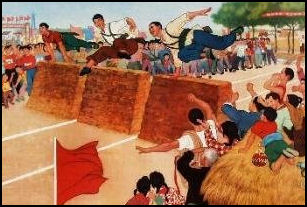 The only track and field medal that China won before 2004 was a bronze in the high jump by Zhu Jianhua in 1984. Huang Zhihong, a 90-kilo female shot putter, took second place in the 1995 World Championships. She was regarded as a potential Olympic medalist and went around, sporting flashy sunglasses and driving an expansive car.
The only track and field medal that China won before 2004 was a bronze in the high jump by Zhu Jianhua in 1984. Huang Zhihong, a 90-kilo female shot putter, took second place in the 1995 World Championships. She was regarded as a potential Olympic medalist and went around, sporting flashy sunglasses and driving an expansive car.
Zhu Jianhua broke the world record in the high jump, with a leap of 2.37 meters at a qualifying event in China in June 1983. A month later he broke the record again, by one centimeter, at a national meet in China and again, reaching 2.39 meters, at a meet in Germany in June 1984. He won bronze medal at the inaugural world championship in 1983 and at the 1984 Olympics in Los Angeles but never won a gold medal or world championship.
On China’s chances in track and field one coach said, “Chinese athletics is gradually closing the gap to the top world levels but generally we are still a long way off.”
See Articles Under OLYMPICS factsanddetails.com ; Chinese Olympic Committee en.olympic.cn ; China’s Olympic History china.org.cn ; Book: “Olympic Dreams: China and Sports, 1895-2008" by Xu Gouqi
Track and Field at the 2008 Beijing Olympics
China didn’t win any gold or silver medals in track and field and managed to only take two bronzes: in the marathon and the women’s hammer throw.
The track events were held in spectacular fashion in the Bird’s Nest stadium. Among the interesting touches were remote controlled robot cars that picked up the javelins and delivered them to the competitors.
Chinese Women Runners
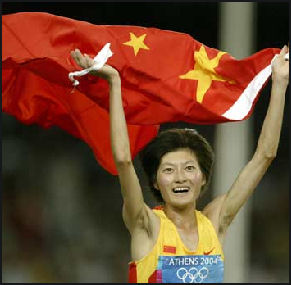
Xing Huina In 1993, females runners from the northeastern Chinese province of Liaoning appeared suddenly on the scene and annihilated a half dozen world records which had stood for years and won three gold medals at the World Track and Field Championships in Stuttgart.
The most phenomenal performance was put in by Wang Junxia, who set four world records in six days in September 1993. She knocked 23 seconds off the 3,000 meter world record and broke the record three times in three days, twice in heats. Under coach Mao Denzhen, Wang won a gold medal in the 10,000 meters and a silver in the 5,000 meters in Atlanta in 1996. She was awarded the Jesse Owens Prize in 1994, the first and only Chinese or Asian to win the prize. She reportedly trained so hard her toenails fell off.
Wang Junxia was the star member of Ma’s Army. Born in 1970 and sometimes called the “Oriental divine deer,” because her running style resembled that of a deer, she won the 10,000 meter world championship title in 1993 and broke the world record in the 10,000 meter one month later in China with an astounding time of 29:31.78, knocking more than 42 seconds off the old world record. It was the first sub 30 minute time in the event.
In 1997, Chinese women began breaking records again. Seventeen-year-old Ding Yanmei knocked more than five seconds off the 5,000 meter world record and two teammates finished behind her were four seconds ahead of the old record. The records were broken during heats rather than finals at a local meet in China.
Chinese officials denied that their athletes used steroids or other performance-enhancing drugs, and attributed their success to "their peasant stock, willingness to do arduous workouts and mysterious elixirs made from worms, caterpillar fungus and turtle's blood." [Source: Sports Illustrated]
Xing Huina and Sun Yingjie
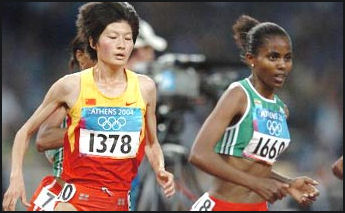
Xing passing an Ethiopian runner at Athens Xing Huina won the gold medal in the women’s 10,000 meter run at the 2004 Summer Olympics. She defeated three world class Ethiopians: Ejegayhu Dibaba, just .62 seconds behind Xing, two-time Olympic champion Derartu Tulu and world championship silver medalist Worknesh Kidane, who finished second, third and forth respectively.
Twenty-one-year-old Xing said afterwards, “Winning the championship was beyond my expectation. I am so happy about it, I think our efforts deserve a reward. I realized my dream ahead of time. Four years from now I will be 25, and that is the golden age for an athlete. That will be a huge opportunity for me.” The Ethiopians claim the only reason she won was because they weren’t paying attention to her. Dibaba said, “I thought I had won...I missed the Chinese athlete completely. Had I seen her, I would have put in more effort and passed her.”
In 2003, Sun Yingjie won a bronze medal in the 10.000 meters at the world championships. She has a very unusual and distinctive style of running in which she held her arms almost straight down as she ran. She led the entire race until she was passed with 300 meters left to go. The race was won by Ethiopian Berhane Adhere, who set a meet record and ran the third fastest time ever.
As of April 2004, Sun had the world’s third fastest time in the marathon. Sun said she planned to run two events in the 2004 Olympics: either the 10,000 and marathon or the 5,000 and 10,000. In November 2005, she failed her second drug test and was banned for two years from the sport despite reports that another athlete spiked her drink with the drug. She had tested positive for androsterone, a banned testosterone derivative. She returned to competitive marathon running in January 2008.
Training for Chinese Women Runners
Women runners sometimes wake up at 4:00am and run 40 miles a day. Their feet get to be so swollen they can barely fit them into their shoes. Some become permanently crippled by the regimen. One former marathon runner interviewed by the Los Angeles Times ended up with feet that were so deformed that she couldn’t walk for more than 10 minutes before having to sit down.
The runner told the Los Angeles Times, “We would get up at 4 in the morning in the summers and 5 in the winters. We would run up and down hills, sometimes 40 miles a day.. For food we ate rotten vegetables and rarely any meat. We got to go home only once in five years. No one dared to complain for fear of being beaten.” She said when her feet hurt so much she couldn’t walk her coach gave her injections that numbed her feet and sent her out running again..
Ma Junren, the Snake Oil Running Coach
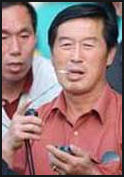
Ma Junren The coach of the women who broke the worlds records in the 1990s was Ma Junren, an illiterate former pig farmer and prison guard described by Sport's Illustrated's Alexander Wolff as "Princess Di, O.J. Simpson and Michael Jackson rolled into one," "a hybrid of Bobby Knight, Bela Karolyi and Timothy Leary” and a "millionaire celebrity, a two-fisted smoker with throat cancer who's part medicine man, part con man and part guru."
Ma lived in three-story Mediterranean-style villa paid for with prize money made by his runners and royalties from special elixirs marketed under his name. It is said that he believed that his mother was a deer goddess.
The women in "Ma's army" did training runs equivalent to a marathon a day at a 2,336-meter-high training site on the Qinghai-Tibet plateau, sometimes in the middle of the night, while Ma yelled at them from a van or the side car of a motorcycle or stood by the side of road smoking a cigarette with a holder..
Many of the girls were poor peasants. They were forbidden from having boyfriends, wearing make up, sporting long hair or wearing anything other than sports clothes. One runner who went on a date was kicked off the team. Ma also monitored the girl's meals and ordered them to bring him food and do his laundry.
Ma's Bizarre Training Elixirs
Ma developed special elixirs made with caterpillar fungus and turtle blood to help the girls recover from their long workouts and made a fortune marketing these products to the general public. A 20 milliliter vial of his turtle blood elixir, Ma-One, sold well at the Asian Games in Hiroshima at $7 a vial.
The caterpillar fungus tonic, manufactured under the name Worm Hair King by Zhing Shan City technology, is made from a rare fungus that grows on the body of dead caterpillars in the western provinces of China. The thick dark-brown liquid is supposed to increase circulation and open bronchial tubes and according to its maker, "If you are 60 years old and walk with a cane, drink 16 bottles and you will not need a cane any more."
In the late 1990s, Ma betrayed Zhing Shan and began doing endorsements for China Turtle essence in return for $50,000 in cash and a $70,000 Audi. Later he signed a contract with a herbal medicine manufacturer that paid Ma $10 million and gave him a stake in the company.
The owner of the Zhing Shan told Sports Illustrated, "We supported Ma when he was just a pig farmer. He should be full of shame. Ma is worse than a blind American capitalist. At least in America you must honor a contract. Advertising turtle drink. Ha!...He’s like your person O.J. Simpson people still always talk about this man Ma. But everything they are saying is bad."
Controversies Surrounding Ma
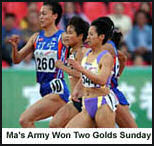 In 1993, the Ma’s army was so unhappy with his training methods that they defected en masse. After Ma's women broke their string of world record's, Chinese authorities suggested that he train the men’s team. Ma took them up on their offer but after a couple of weeks all the men quit.
In 1993, the Ma’s army was so unhappy with his training methods that they defected en masse. After Ma's women broke their string of world record's, Chinese authorities suggested that he train the men’s team. Ma took them up on their offer but after a couple of weeks all the men quit.
In 1994, 17 runners-including world record holder Wang Junxia — walked out training of camp with the support of their parents to protest Ma's withholding of Mercedes Benz cars and cash prizes worth hundreds of thousands of dollars that had been awarded the athletes. Ma argued that it was a common Asian belief that students should give their prize money to their teachers.
Chinese authorities were so worried that Ma fed his runners banned substances that a drug tester was posted permanently at his training site and some runners were given so many blood and urine tests they threatened to quit.
In the late 1990s, Ma helped coach Chinese rowers, who won five out of five gold medals in the events they entered. At the Asian Games in 1998, Ma trained a new army of women's runners that were scheduled to appear at the World Track and Field Championships in Seville in 1999. At the last minute the team pulled out, rasing suspicions that some runners had tested positive for drugs.
Ma’s runners were kicked off the Olympic team before the 2000 Summer Games in Sydney.
Wang Dexian
Women runners under Wang Dexian have been shut off from the outside world, forbidden from dating or even talking to strangers, beaten with whips and batons for not running hard enough, and knocked off their feet with the bumper of the car that the coach uses to follow the runners during training sessions.
Some of the runners have filed a law suit against Wang, accusing him of pocketing their wages. One runner told the Los Angeles Times, “We trusted him because we were young and he was our coach. He told us he’d save the money for us and we can have it all back later and not a bit will be missing. Wang insists he spent all the money on the athlete’s training.
Sun Jingjie, bronze medalist in the 5,000 meters at the 2003 world championships and a half marathon world champion, accused Wang of whipping her with a belt and subjecting her to other forms of physical abuse for a decade. Sun was banned from her sport for two years because of a doping violation.
In January 2006, Wang was banned for life from coaching following doping violation by two of his runners.
Marathons in China
A marathon run in Beijing in 1973 was shortened to accommodate runners weakened by the Cultural Revolution. More than a million people lined the sidewalks to watch and cheer the runners.
Beijing hosts a marathon. In the race in October 2005, Kenyan runner Benson Cherono was ahead of the field by about five minutes but missed the last section because officials failed to show him the way to the stadium. With 800meters to go and no one to show him the way he followed the TV truck he had followed most of the race. The Kenyan was declared the winner because he was so far ahead but was denied a finish line finish and his time of 2 hours, six minutes and 55 second was not allowed to stand.
Chinese runner Zhou Chunxui won the women’s title in the 2007 London Marathon. She is the first Chinese—either man or woman—to win one of the World Marathon Majors, which consists of the London, New York, Boston, Chicago and Berlin marathons. It was her third marathon outside Asia, She was fifth at the 2005 world championship and 22rd in the 2004 Olympics.
Marathon Cheating in China
“In January 2010, thirty runners — almost a third of the runners who finished in the top 100 — were disqualified from a marathon in the southern port city of Xiamen for cheating,” according to The Guardian. “Some of them hired imposters to compete in their place. Some competitors jumped into vehicles part way through the route, Chinese media reported, while others gave their time-recording microchips to faster runners. Numbers 8,892 and 8,897 both recorded good times — but only thanks to number 8,900, who carried their sensors across the finish line.” [Source: Tania Branigan, The Guardian, January 21, 2010]
Jiefang Daily, the Shanghai Communist party newspaper, said organizers caught the cheats when they scanned video footage. The paper said most of those involved had apologized, but that those showing an “uncooperative attitude” would be prevented them from competing in future events. [Ibid]
“There was more than just prestige at stake in the marathon. Competitors stood to gain a crucial advantage in China's highly competitive university entrance exams. Those who finished in under two hours and 34 minutes could add extra points to their score in the gaokao, helping to explain why several of those disqualified came from a middle school in Shandong province.” [Ibid]
“The exams are so crucial to the future of Chinese children that both students and their families will go to extraordinary lengths to guarantee success. Last year, eight parents and teachers were jailed on state secret charges after using communication devices - including scanners and wireless earpieces - to help pupils cheat. [Ibid]
“Organizers of the international event in Xiamen have vowed to increase surveillance in future, saying that they had only 200 monitors to oversee 50,000 runners in the marathon and accompanying races. The problem is not a new one; in 2007, 19 competitors in Beijing were caught with multiple timing sensors. Nor is such cheating restricted to China. Rosie Ruiz remains infamous in the United States for her victory in the women's race in Boston in 1980. She ran only a few miles and covered most of the distance by subway.” [Ibid]
Marathon at the 2008 Beijing Olympics
The marathon began at Tiananmen Square and passed by the Tempe of Heaven, Yongding Gate, Peking and Tsinghua universities and finished at the Bird’s nest sativum.
Zhou Chunxia won he bronze medal in the women’s marathon and came very close t getting the silver. With Romanian Constantina Tomescu far out in front. Zhou and catherine Ndereba of Kenya broke away from another Chinese and Kenyan runners as they entered the Bird Nest stadium. Ndereba surged ahead but Zhou almost caught her at the end,
Zhou won the London marathon in 2007 and finished second in the 2007 track and field world championships in Osaka.
After the 2008 Beijing Olympics
In October 2009, women’s 100 meter national champion Wang Jing was stripped of her title after failing a drug test.
China’s Bai Xue won the gold medal in the women’s marathon at 2008 world track and field championship in Berlin. It was China’s only gold medal in the meet. She ran neck and neck with a Japanese runner in final kilometers and broke clear with one kilometer to go and was able to maintain her lead to the finish.
Image Sources: 1) Landsberger Posters http://www.iisg.nl/~landsberger/; 2) Athletics Alberta; 3) Coca Cola; 4) AP, USA Today; 5) Liu Xiang Information; 6) Xinhua; 7) China.org ; 8) China Daily ; 9) Sports Illustrated
Text Sources: New York Times, Washington Post, Los Angeles Times, Times of London, National Geographic, The New Yorker, Time, Newsweek, Reuters, AP, Lonely Planet Guides, Compton’s Encyclopedia and various books and other publications.
Last updated June 2010
